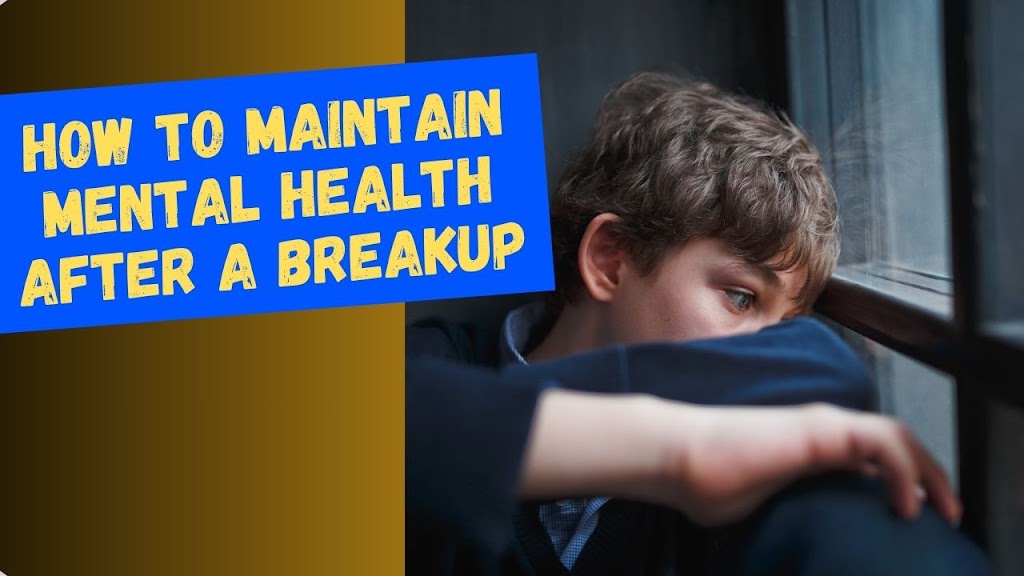
How to Maintain Mental Health After a Breakup
Breaking up with a significant other can be one of the most challenging experiences in life. It can leave you feeling lost, heartbroken, and overwhelmed. However, maintaining your mental health during this period is crucial for your overall well-being and recovery. This article will provide you with comprehensive strategies to help you navigate through this tough time and come out stronger.
 |
| How to maintain mental health after a breakup |
Understanding the Impact of a Breakup on Mental Health
Emotional Turmoil
A breakup often triggers a wide range of emotions, including sadness, anger, confusion, and even relief. Understanding that these feelings are normal and part of the healing process is the first step towards recovery.
Psychological Effects
Breakups can lead to psychological distress, including depression and anxiety. It’s important to recognize these symptoms early and seek professional help if needed.
Depression and anxiety after a breakup are common but manageable with the right support and strategies.
Physical Manifestations
Emotional pain can sometimes translate into physical symptoms such as headaches, fatigue, or changes in appetite. Taking care of your physical health is just as important as addressing your emotional well-being.
Strategies to Maintain Mental Health
llow Yourself to Grieve
Grieving is a natural response to loss. Allow yourself to feel the pain and process the emotions. Suppressing your feelings can prolong the healing process.
It’s okay to cry and feel sad after a breakup. These emotions are a normal part of the healing journey.
Seek Support from Friends and Family
Talking to trusted friends and family members can provide emotional support and help you feel less isolated. Sharing your feelings with others can also offer new perspectives and advice.
Practice Self-Care
Engage in activities that you enjoy and that make you feel good. This could include exercise, hobbies, or spending time in nature. Self-care helps to boost your mood and reduce stress.
Regular exercise, even a short walk, can significantly improve your mood and mental health.
Avoid Negative Coping Mechanisms
While it might be tempting to turn to alcohol, drugs, or other harmful behaviors to numb the pain, these can worsen your mental health in the long run. Focus on healthy coping mechanisms instead.
Stay Connected but Set Boundaries
It’s important to stay connected with others, but also to set boundaries with your ex-partner if continued contact is detrimental to your healing. This might mean limiting or cutting off communication for a while.
Rebuilding Your Life
Rediscover Yourself
A breakup can be an opportunity to rediscover who you are outside of a relationship. Explore new interests, set new goals, and focus on personal growth.
Take this time to pursue hobbies or interests that you might have neglected during your relationship.
Establish a Routine
Having a daily routine can provide a sense of normalcy and control during a chaotic time. Structure your day with activities that keep you engaged and productive.
Seek Professional Help
If you find it difficult to cope with the breakup, consider seeking help from a mental health professional. Therapy can provide you with the tools and support you need to move forward.
Therapy can be a powerful tool in navigating the emotional aftermath of a breakup.
Join Support Groups
Support groups offer a safe space to share your experiences and hear from others who are going through similar situations. This can provide both comfort and practical advice.
Fostering Positive Relationships
Build New Connections
After a breakup, it’s important to build new connections and friendships. This can help fill the void left by your previous relationship and introduce you to new experiences and perspectives.
New friendships can offer fresh perspectives and help you heal after a breakup.
Strengthen Existing Relationships
Spend time with loved ones who uplift and support you. Strengthening these bonds can provide a strong support system during this challenging time.
Set Healthy Boundaries
Setting boundaries is crucial in any relationship. Learn to communicate your needs clearly and protect your mental well-being by setting limits that work for you.
Moving Forward with Confidence
Focus on Personal Growth
Use this time to focus on your personal growth and development. Set new goals, take up new hobbies, and invest in your self-improvement.
Practice Mindfulness and Meditation
Mindfulness and meditation can help you stay grounded and present, reducing stress and anxiety. Incorporating these practices into your daily routine can greatly enhance your mental well-being.
Mindfulness practices can help you stay present and reduce anxiety after a breakup.
Celebrate Small Wins
Celebrate your progress, no matter how small. Each step forward is a victory and deserves recognition.
FAQs
How long does it take to get over a breakup?
The time it takes to get over a breakup varies from person to person. It can take weeks, months, or even longer. Be patient with yourself and allow yourself the time you need to heal.
Is it okay to stay friends with my ex?
Staying friends with an ex can be complicated and depends on both parties’ ability to maintain healthy boundaries. Consider whether the friendship will help or hinder your healing process.
How can I stop thinking about my ex?
Distracting yourself with activities, spending time with friends, and focusing on personal growth can help reduce thoughts about your ex. Mindfulness and meditation practices can also be beneficial.
When should I seek professional help?
If you find it difficult to cope with the breakup, experience symptoms of depression or anxiety, or have thoughts of self-harm, it’s important to seek professional help immediately.
For more information on mental health and well-being, visit our website
—
Remember, healing takes time, and it’s important to be patient with yourself as you navigate this journey. For further resources and support, you can explore our other articles on mental health





